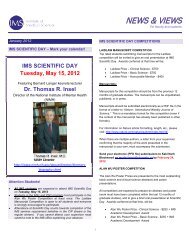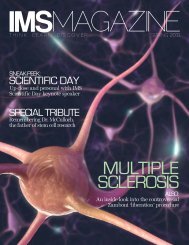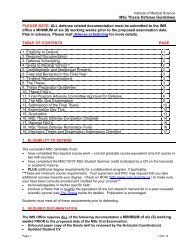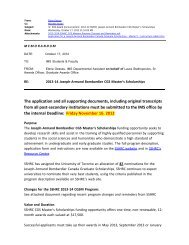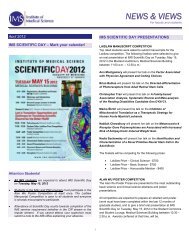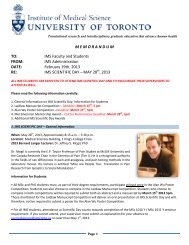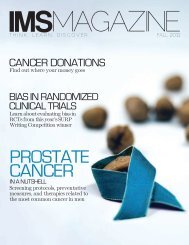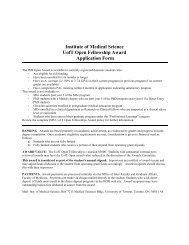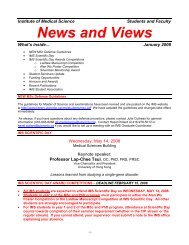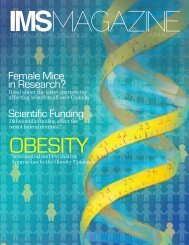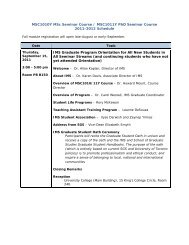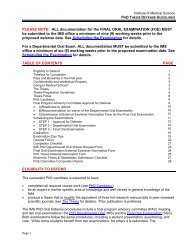IMS Magazine - Summer 2012 edition in PDF format - Institute of ...
IMS Magazine - Summer 2012 edition in PDF format - Institute of ...
IMS Magazine - Summer 2012 edition in PDF format - Institute of ...
Create successful ePaper yourself
Turn your PDF publications into a flip-book with our unique Google optimized e-Paper software.
FEATURE<br />
Psychiatric Pharmacogenetics<br />
Maximiz<strong>in</strong>g Benefits While M<strong>in</strong>imiz<strong>in</strong>g Side Effects<br />
By Zeynep Yilmaz, PhD candidate<br />
liz<strong>in</strong>g medications, essentially co<strong>in</strong><strong>in</strong>g the<br />
term “pharmacogenetics.” Pr<strong>of</strong>. Kalow and<br />
I tra<strong>in</strong>ed students <strong>in</strong> my laboratory, and before<br />
he passed away, he saw the fruits <strong>of</strong> these<br />
labours with the delivery <strong>of</strong> genetic tests for<br />
characteriz<strong>in</strong>g drug metabolism. Another<br />
Toronto researcher, Dr. Victor L<strong>in</strong>g, discovered<br />
the role <strong>of</strong> drug transporter prote<strong>in</strong>s,<br />
for which there are now DNA-based tests to<br />
determ<strong>in</strong>e their variation across <strong>in</strong>dividuals.<br />
Given this powerful history <strong>in</strong> pharmacogenetics<br />
at the University <strong>of</strong> Toronto, I was<br />
<strong>in</strong>spired to carry the science forward us<strong>in</strong>g<br />
the developments <strong>in</strong> the human genome and<br />
genetic test<strong>in</strong>g technology.<br />
James L. Kennedy, MD, MSc, FRCP(C)<br />
Dr. James L. Kennedy is the Director<br />
<strong>of</strong> the Neuroscience Research<br />
Department at the Centre for Addiction<br />
and Mental Health and the Co-Director<br />
<strong>of</strong> the Bra<strong>in</strong> and Therapeutics Division <strong>in</strong><br />
the Department <strong>of</strong> Psychiatry, University <strong>of</strong><br />
Toronto. Dr. Kennedy has an extensive, and<br />
unique comb<strong>in</strong>ation <strong>of</strong> tra<strong>in</strong><strong>in</strong>g <strong>in</strong> psychiatry,<br />
genetics, and neuroscience. As a pr<strong>of</strong>essor<br />
and full-member <strong>of</strong> <strong>IMS</strong>, he has supervised<br />
well over a hundred tra<strong>in</strong>ees, <strong>in</strong>clud<strong>in</strong>g<br />
undergraduate and graduate students, postdoctoral<br />
fellows, and visit<strong>in</strong>g scientists.<br />
What is pharmacogenetics, and why is it<br />
important to study?<br />
Pharmacogenetics is the science <strong>of</strong> l<strong>in</strong>k<strong>in</strong>g a<br />
person’s DNA sequence with their response<br />
to medication. Because DNA provides its<br />
own unique bluepr<strong>in</strong>t <strong>of</strong> the body, we can<br />
make specific predictions as to the right drug<br />
and its correct dosage for a particular patient.<br />
We hope to prevent patients from cont<strong>in</strong>u<strong>in</strong>g<br />
for weeks on <strong>in</strong>effective medication and<br />
then hav<strong>in</strong>g to switch to another medication,<br />
go<strong>in</strong>g through the entire disappo<strong>in</strong>t<strong>in</strong>g sequence<br />
<strong>of</strong> non-response. We need to move<br />
beyond trial-and-error prescription <strong>of</strong> medications.<br />
With pharmacogenetics, we can help<br />
predict which patients will not respond to a<br />
particular medication, and also predict the<br />
best choice <strong>of</strong> medication on the basis <strong>of</strong><br />
their genotype and psychiatric condition.<br />
How did you become <strong>in</strong>terested <strong>in</strong> pharmacogenetics?<br />
I became <strong>in</strong>terested <strong>in</strong> pharmacogenetics<br />
when I witnessed many patients suffer while<br />
receiv<strong>in</strong>g the standard textbook dose <strong>of</strong> an<br />
antidepressant or antipsychotic medication. I<br />
saw the answer was <strong>in</strong> the power <strong>of</strong> new DNA<br />
technology for test<strong>in</strong>g patients to determ<strong>in</strong>e<br />
their comb<strong>in</strong>ation <strong>of</strong> genetic variants and<br />
whether a given patient metabolized the<br />
medication quickly or slowly. I had also read<br />
sem<strong>in</strong>al papers by Pr<strong>of</strong>. Werner Kalow from<br />
his work here at the University <strong>of</strong> Toronto <strong>in</strong><br />
the late-1950s and 1960s. He was the first to<br />
po<strong>in</strong>t out that people were genetically predisposed<br />
to hav<strong>in</strong>g different rates for metabo-<br />
What are some <strong>of</strong> the cl<strong>in</strong>ical applications<br />
<strong>of</strong> pharmacogenetics <strong>in</strong> psychiatry?<br />
We have a number <strong>of</strong> patented genetic discoveries<br />
mak<strong>in</strong>g their way <strong>in</strong>to the cl<strong>in</strong>ic, <strong>in</strong>clud<strong>in</strong>g<br />
a test us<strong>in</strong>g dopam<strong>in</strong>e system genes<br />
to predict risk for tardive dysk<strong>in</strong>esia (uncontrolled<br />
muscle movements) as a result <strong>of</strong><br />
prolonged use <strong>of</strong> antipsychotic medications.<br />
We also have a genetic test that identifies depressed<br />
patients who are at risk for develop<strong>in</strong>g<br />
mania as a result <strong>of</strong> their antidepressant<br />
treatment. We have just published an important<br />
paper show<strong>in</strong>g the role <strong>of</strong> the melanocort<strong>in</strong><br />
4 receptor (MC4R) gene <strong>in</strong> determ<strong>in</strong><strong>in</strong>g<br />
the risk for antipsychotic-<strong>in</strong>duced weight<br />
ga<strong>in</strong>. The newer antipsychotic medications<br />
have the side effect <strong>of</strong> substantial weight ga<strong>in</strong>;<br />
some patients will ga<strong>in</strong> more than 100 lb dur<strong>in</strong>g<br />
one year <strong>of</strong> treatment and <strong>of</strong>ten go on to<br />
develop diabetes and heart disease. After the<br />
<strong>in</strong>itial f<strong>in</strong>d<strong>in</strong>g <strong>of</strong> this gene’s effect <strong>in</strong> the first<br />
sample, we replicated the exact same result <strong>in</strong><br />
three <strong>in</strong>dependent samples.<br />
It is now possible for the physician to see<br />
a patient <strong>in</strong> the morn<strong>in</strong>g, for the patient to<br />
have a quick sampl<strong>in</strong>g <strong>of</strong> their saliva us<strong>in</strong>g a<br />
swab, and this sample to be shipped <strong>of</strong>f to a<br />
specialized lab where the genotyp<strong>in</strong>g <strong>of</strong> the<br />
relevant genetic variants for common medications<br />
can be done overnight. The results<br />
are emailed to the physician the next day, and<br />
the physician writes a prescription on the ba<br />
Photos by Yekta Dowlati.<br />
17 | <strong>IMS</strong> MAGAZINE SUMMER <strong>2012</strong> GENOMIC MEDICINE



